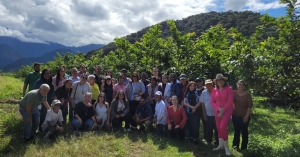In Rio de Janeiro, Dominican delegation sees experiences on school feeding and cooperativism
The objective of the visits was to exchange knowledge to strengthen school feeding in the Dominican Republic.

Niterói, Rio de Janeiro, May 31, 2023 - An international delegation from the government of the Dominican Republic spent two days in the state of Rio de Janeiro to learn about the implementation of the National School Feeding Program (PNAE) in the city of Niterói and visit a cooperative of family farmers located in the city of Guapimirim.
The mission, which took place on May 29th and 30th, was organized within the framework of the project "Healthy School Environment through Innovative Strategies for Strengthening the School Feeding Program (PAE)" in the Dominican Republic, and co-organized by the project Consolidation of School Feeding Programmes in Latin America and the Caribbean, developed under the Brazil-FAO International Cooperation.
The school feeding project of the Brazil-FAO Cooperation is jointly implemented by the National Fund for Educational Development of the Ministry of Education (FNDE/MEC), the Brazilian Cooperation Agency of the Ministry of Foreign Affairs (ABC/MRE), and the Food and Agriculture Organization of the United Nations (FAO).
Approximately 15 professionals from the Dominican Republic and Brazil were in the state of Rio de Janeiro to hold discussions with school feeding policy officials, family farmers who supply their food production to this policy, and experts from the Collaborating Center on Food and Nutrition of the Federal Fluminense University (CECANE-UFF).
The group consisted of members from the FAO in the country, the National Institute of Student Welfare (INABIE), the Supérate Programme, and the Ministries of Agriculture and Health, as well as members of the Brazil-FAO International Cooperation, representing the ABC, FAO, and FNDE. The Dominican Republic is one of the 21 countries in Latin America and the Caribbean that are part of the Sustainable School Feeding Network (RAES), an international cooperation initiative created by the government of Brazil and supported by FAO to strengthen school feeding policies in the countries of the region.
The visits
The mission promoted dialogue and the exchange of experiences on school feeding programmes in order to design strategies to address the challenges of guaranteeing the Human Right to Adequate Food.
The city of Niterói, with approximately 500,000 inhabitants, was chosen due to the close relationship between different public actors, such as the Federal University, the municipal government, family farming, and schools, which guarantees more efficient and successful implementation of the school feeding policy.
Professionals from the City Education Department explained in detail how the local school feeding programme works, which serves around 30,000 students from 122 schools, presenting innovations and challenges. The role of CECANE in supporting the implementation of the school feeding policy was also highlighted, as a Brazilian innovation that has attracted the attention of several policy managers in the region.
In partnership with the Municipality of Niterói, CECANE-UFF promotes training in agroecology and institutional markets for urban family farmers, with the aim of increasing public purchases for institutional markets such as the PNAE. "CECANE, in partnership with FNDE, carries out many actions to promote strategies that improve and qualify the school feeding programme throughout Brazil. It is very important to engage in dialogue with the Brazil-FAO Cooperation, through FAO, ABC, and FNDE, which facilitates this exchange in Latin America and the Caribbean, so that we can learn from experiences in other countries. This coordination between institutions is very strategic for thinking about new products and actions that reach larger dimensions. When we work together, the power of institutions is greater," evaluated Patricia Camacho, professor and coordinator of CECANE-UFF.
Cooperativism
The visit to the farmers took place at the Agroverde Cooperative, located in Guapimirim, in the mountainous region of Rio de Janeiro, which supplies food to more than 400 municipal and state schools in Rio de Janeiro. There, it was possible to visit plantation areas and have conversations with several producers, as well as the cooperative's president, Rita Alves.
"The PNAE is a process of support and incentive for farmers to plant. When a municipality opens a call for proposals and we can sell with an added price, with planning, the flow is better and wider. The PNAE is very important for the farmer because it ensures that they can plant, sell, and receive. We didn't have this certainty before," summarized the president.
For Najla Veloso, coordinator of the project Consolidation of School Feeding Programmes in Latin America and the Caribbean, the experience of visiting the cooperative was one of witnessing a "revolutionary process," with the strengthening of family farming through public purchases. "In the past, providing food from family farming for school feeding was a dream, something that seemed impossible. But through this process of construction and struggle, it became possible, as we can see in this cooperative," she said. "The exchange is a way to empower the various actors, both national and international, and deepen the dialogue about the challenges and progress of each institution."
Representing the Dominican delegation, Miriam Guzmán, Deputy Minister of Rural Development at the Ministry of Agriculture of the country, evaluated that the visits in Rio de Janeiro serve as a stimulus to advance a similar process in the country, especially with the strengthening of coordination among different institutions.
"Cooperativism is the great strategy to make something essential possible: having food on the table, in the countryside, and in the cities. Without this rural development, there is no food, there is no peace. Thank you for presenting us with this beautiful experience. "These visits with all the actors supporting school feeding are fundamental. It is crucial to learn about and implement these actions, such as strengthening family farming and food and nutritional education initiatives in our country, to strengthen and elevate the level of school feeding in the Dominican Republic," summarized Jesús Rodriguez, from the department of international cooperation of INABIE.
